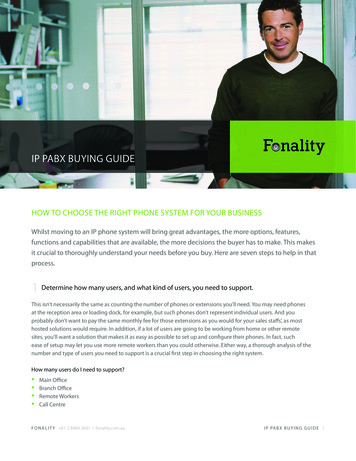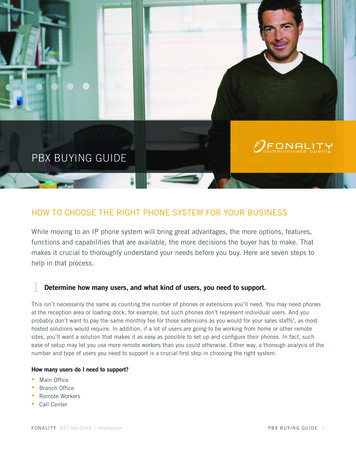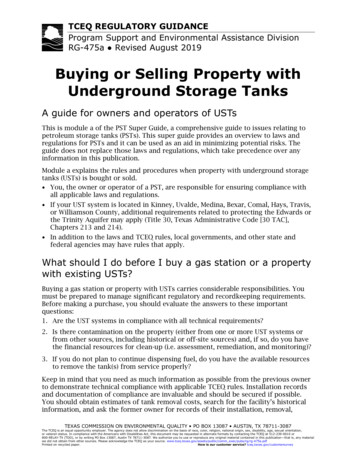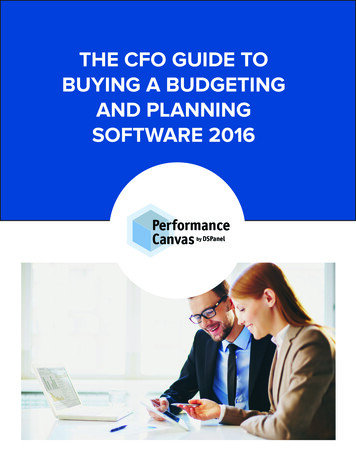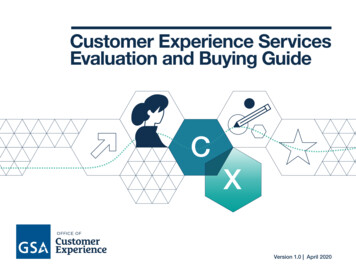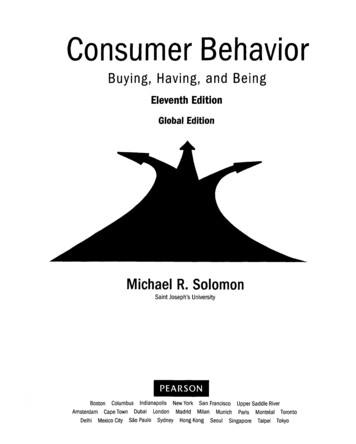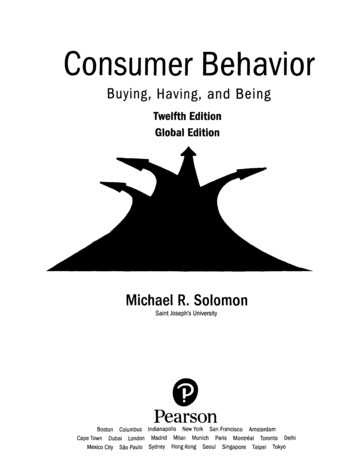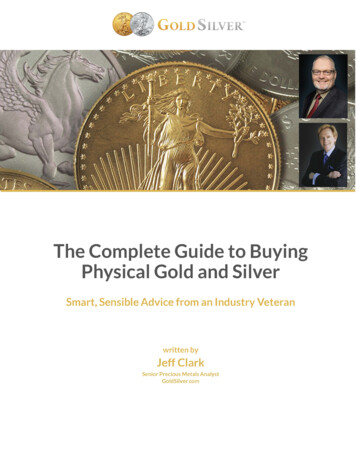
Transcription
The Complete Guide to BuyingPhysical Gold and SilverSmart, Sensible Advice from an Industry Veteranwritten byJeff ClarkSenior Precious Metals AnalystGoldSilver.com
Table Of Contents1. Welcome to our complete guide on buying physical gold and silver2. Why Should I Buy Physical Gold and Silver?4. What Gold and Silver Do I Buy?7. How Much Gold and Silver Should I Buy?8. What Portion of My Bullion Should Be In Bars Vs. Coins?12. Where to Buy Gold and Silver14. How to Keep Your Gold and Silver Safe21. Why Buy From GoldSilver?
Welcome to our complete guide on buying physical gold and silver!We’re convinced you’re in the right place, at the right time, to capitalize on the next bull marketin precious metals. We’ll tell you the why, what, where, and how of buying precious metals—everything you need to know to build a hard assets portfolio that will position you to profit.But investing in gold is about more than just making money.Many investors today believe their portfolios are diversified, yet upon even a casual review findtheir brokerage accounts full of mostly stocks and bonds. This is not true diversification, andleaves a portfolio vulnerable to periods of high volatility, economic downturns, and marketcrashes.Real diversification starts by owning uncorrelated assets. In other words, an asset that zigs whenthe rest of your portfolio zags. A hedge, which can be especially valuable during the nextinevitable bear market. True diversification includes an asset that can shield your portfolio fromthe financial uncertainties that always seem to accompany bear markets, scary and suddenreversals, and other unexpected events.Gold can do this for you—it’s done it for every investor in history that’s owned a meaningfulamount of bullion during periods of fear or unrest. Successful investing is not just picking a stock that’s expected to rise, but involvesunderstanding how gold can act as a buffer for your other investments, and actually add toyour net worth in times of crisis. How many investments do you own that will do this?Gold also offers specific financial benefits. Mike Maloney is convinced that gold and silver will bethe next super-bubble. We look forward to that, but it’s about more than just the potential rise inprice. Just as important, gold can preserve your purchasing power in the midst of all kinds ofturmoil—currency depreciation, economic slowdowns, government miscues, geopolitical conflicts,or any other crisis that may come our way. Imagine how important it will be to own an investmentthat preserves your standard of living at a time when other investments are losing value.The timing and specific nature of the next systemic crisis is impossible to predict, but there is a100% certainty another one is on the way, as history shows. It’s no wonder that gold is a coreasset of generationally wealthy families, institutional investors, central banks, and everyindividual investor who has instinctively felt the need to have some financial insurance in place.You requested this report, so we think that includes you. Let’s jump in Complete Guide to Investing1
Why Should I Buy Physical Gold and Silver?In a highly digital world, where our daily lives are increasingly conducted and transacted online, itmay seem unnecessary to buy a physical investment. But that line of thinking robs you of one of thebest diversification tools available today. In fact, it is gold’s physical attributes that allow us tocapture all kinds of financial advantages that other investments simply don’t possess, advantagesmost investors haven’t considered or realized they could’ve benefitted from until it’s too late.By physical gold, we don’t mean things like bullion ETFs, which are paper representations thattrack the gold price but don’t offer delivery of real metal nor a “pool” account where you shareownership of a gold bar with other investors nor a trading service where you buy and sell metalthat’s not yours or that comes with myriad other restrictions.No, we’re talking about real gold and real silver physical metal you can hold in your hands, whereyou have total and complete ownership, total andcomplete liquidity.Considerable all the advantages you gain by owning physical gold. Gold is A tangible asset. You can hold 50,000 of gold coins in your hand, which you can’t do with mostany other investment. It can’t be destroyed by fire, water, or even time. And unlike othercommodities, gold doesn’t need feeding, fertilizer, or maintenance. Free of counterparty risk. Gold requires no paper contract to be made whole. It is part of theonly financial asset class that is not simultaneously some other entity’s liability. It doesn't requirethe backing of any bank or government. Ask shareholders of Bear Stearns and Lehman Brothers ifthis is important. A store of value. Gold and silver prices fluctuate, of course, but their value is timeless. Considerhow gold retains its purchasing power over long periods of time, while the US dollar, for example,has lost 98% of its purchasing power since the creation of the Federal Reserve in 1913. And sincegold and silver will outlast you, they’re an ideal asset to pass on to your heirs.By the way, it’s a faulty argument that gold doesn’t produce any income. That’s not gold’s role. Itsfunction is as money and as a store of value. That’s also why it shouldn’t be viewed as acommodity; it doesn’t get used up, like oil or cotton. This is another reason gold has served asmoney for so long. Highly liquid. Gold and silver bullion can be sold virtually anywhere in the world. There are golddealers in just about every major city on the planet. And in a crisis, both metals will be in highdemand. Compare this high liquidity to artwork, which takes longer to sell, has a smaller customerbase, and usually comes with a big commission. Value-dense. You can hold 50,000 of gold coins in the palm of your hand. Gold takes up suchlittle space that you can store a higher value of it in a safe deposit box than stacks of dollar bills.Complete Guide to Investing2
Private and confidential. How many assets can you say that about in today’s world? You mustpay taxes on any gain, of course, but if you want a little privacy or confidentiality, just buy somephysical gold or silver! Portable. You can take some gold with you wherever you go in the world. Can’t be hacked or erased. It’s probably not a good idea to keep all your wealth in digital formtoday. Physical gold and silver are immune to cybertheft. Requires no specialized knowledge. If you don’t know how to spot a real diamond, aren’tfamiliar with the paintings of Van Gogh, or don’t know which comic books are more valuable thanothers, just buy some gold bullion. No special skills or advanced training needed. Comes with low maintenance and carrying costs. Compare the cost of a home safe or a smallstorage fee to the costs and taxes and headaches of real estate. You don’t even need a stockbroker to buy and sell gold. How many investments do you know that come with all these advantages?You gain them all by buying gold and silver coins and bars.And that’s not all Gold is usually thought of as a defensive asset. And it is; when fear runs high among investors, goldtends to be at its best. But it can also be a profit-making investment. In fact, did you know that goldhas frequently outperformed stocks and bonds? Check out this research from the World GoldCouncil that spans over four-and-a-half decades.Complete Guide to Investing3
As of the end of 2017, gold has not only registered positive returns over long periods of time, it hasfrequently outgained other investments. There is no reason to expect this trend won’t continue. There is no magic or mystery here. Gold gives you both powerful advantages andlong-term capital gains potential.Let’s talk about what to own, for both protection and profit What Gold and Silver Do I Buy?Cable TV commercials coin ads website pop-ups jewelry promotions headlines of newlydiscovered treasure more TV commercials It can be confusing in a world full of spiffymarketing ads and paid celebrity endorsements to know what an investor should actually buywhen it comes to gold and silver.It’s been said by many, from coaches to CEOs, and it’s just as true for precious metals: Focuson the basics. And in the case of gold and silver, that advice not only serves you well but will alsosave you a lot of money.After working in the bullion industry for many years, helping many investors make the bestdecisions for their situations, and seeing firsthand the industry’s best and worst, here are the basicguidelines I recommend to all buyers of precious metals, especially those new to this investmentclass.#1: Gold & Silver Coins: Buy “Sovereign”If you want to hold the gold and silver that’s best for purchasing-power protection, as well asstrong liquidity (easy to sell), buy investment-grade bullion. “Investment grade” simply meansmetal that has high quality, purity, and liquidity.And the bullion that meets these criteria the best are what we call sovereign coins, which meansthey’re produced by a government mint. Sovereign coins come with a guarantee of content andpurity, and in most cases, a face value. The face value is mostly symbolic at this point, since thegold price is much higher than the value printed on the coin, but it does mean they are legal tender,something non-sovereign coins are not.The reason everyone should start with—and comprise most of their bullion portfolio of—sovereign coins is because they are the most liquid coins in the world. Every dealer in the worldwill recognize them and buy them from you with little question. They track the price of gold, andhave the widest customer base versus any other coin.Complete Guide to Investing4
Recommendation: All investors should start by buying sovereign gold and silver coins.The most popular gold and silver coins in the world are listed below. Most are 24-karat (some are22-karat), and they all contain a full ounce of gold. Content and purity are guaranteed by theirrespective governments, and other than the Krugerrand are IRA-eligible CoinGold CoinsGovernmentSilver CoinsPurityFace ValuePurityFace Value.9167(22-karat) 500.999 1U.S. MintU.S. governmentMaple Leaf0.9999 50Canadian0.9999 5CanadianRoyal CanadianMintCommonwealth ofCanadaPhilharmonic0.9999 100 Euro0.9991.50 EuroAustrian MintRepublic of AustriaKangaroo0.9999 100Australian0.9999 1AustralianPerth MintAustralian government.9167(22-karat)no face valueNone*South AfricanMintGovernment of SouthAfricaBritannia0.9999 100 pounds0.999 2 poundsRoyal MintBritish governmentBuffalo0.9999 50None**U.S. MintU.S. governmentEagleKrugerrandMintBacking*The silver Krugerrand was manufactured for the first time in 2017; we do not recommend buying it because the premium is excessive—in some cases thetotal purchase price is higher than silver’s all-time high of 50!**You can find silver Buffalo coins, but these are produced by private mints and not the US mint, and thus are not a sovereign coin. Premiums may be low, butwe recommend focusing on sovereign coins rather than privately-produced rounds.NOTE: The Chinese government also produces a sovereign gold and silver coin, the Panda, which is attractive and comes with a guarantee and governmentbacking. However, they do not contain one full ounce and for that reason are not IRA-eligible. Also, the premiums are high and beyond bullion-level pricing,especially on the silver Panda, so we would not start with these coins.If you want to buy gold and silver coins, this is where to start. You’ll have beautiful coins, backed bya sovereign government, which can easily be sold when the need arises. Even if you don’t sell thembut pass them on to your heirs, they will need something that’s easy to sell.Many of these coins come in lower denominations, such as halfounce, but I recommend at least starting with one-ounce coins,because the premiums are higher on fractional coins (and veryhigh when you get down to quarter-ounce and tenth-ounce). Butif you can’t afford a full ounce, some bullion is certainly betterthan no bullion.We’re prepared extensivehow-to guides on buying goldcoins and silver coins. Click onthe links to get more in-depthinformationWhat about rare gold coins? Numismatics can be a fun hobby, and offers the collector beautiful artifactsrepresenting interesting people or historical periods.Unfortunately, many novice investors that dabble in this market have lost money. Read our article Should I BuyNumismatics? 3 Risks to Rare Gold Coins to find out why you should avoid this market unless you’re willing tobecome an educated collector. There are exceptions, though, so if this is something you’re interested in, checkout Should I Buy Collectible Silver? The 3 Criteria to Look ForThis isn’t to say you shouldn’t buy other coins. The point is that every investor should have ameaningful stack of sovereigns before buying anything else. These coins are your safety net, youand your family’s monetary insurance hedge that can be easily sold if the need arises.Complete Guide to Investing5
#2: Gold & Silver Bars: Buy for StorageWhy should an investor consider gold and silver bars?Because they have lower premiums! Ounce for ounce, bars are less expensive, because coins havea more intricate design and thus greater labor and machining costs. Coins may be prettier, butthat appeal costs more to manufacture.There’s another advantage to bars: they’re easier to store. A gold bar takes up less space than thesame number of ounces of coins.In fact, bars were originally designed specifically for ease of storage.And that’s our first hint on what to do with bars: stick ‘em in vault storage.Naturally you can take home delivery of bars and store them yourself. But since they wereoriginally minted for professional storage, and since they’re not as attractive as coins, that’s themost logical thing to do with them.Regardless of what you do with your bars, bars don’t compromise any of the core advantages ofgold and silver: They’re portable, private, liquid, and will last forever.Here’s a few guidelines on what to buy:SIZEBars come in different sizes and weights. They’re as small as one gram (sometimes called wafersbecause they’re so thin), and as big as 400 ounces, which is the size central banks, exchanges, andETFs buy.Generally speaking, the bigger the bar, the smaller the premium. That’s because it costs just asmuch to produce a one-ounce gold bar as a kilo gold bar. But that doesn’t mean you should buythe heaviest bar you can afford Complete Guide to Investing6
Big bars are less divisible. When you sell a big bar, you are liquidating a sizable investment.It’s more practical to sell small bars and exchange the exact amount of gold or silver for theexact amount of currency you need. Exception: If you have a high net worth, considerdividing your purchases between both large and small bars. Fewer potential buyers. Not many investors can afford to buy, say, a kilo gold bar (32.15ounces). If you have smaller-sized bars, you have a greater pool of customers. Exception:Bars in our vault storage will always have high liquidity, because institutional buyers arepart of our pool and would snap them up. Lower counterfeiting risk. Counterfeiters prefer big bars, because they’re worth a lotmore. This is especially true of 1,000-ounce silver bars, so we recommend avoiding those.We don’t even sell them, partly for this reason. Avoids the need for an assay. The bigger the bar, the more likely it could require an assayto be sold. An assay adds extra expense, is inconvenient, and will delay your payout.Exception: if you never take large bars out of professional storage—if they stay in the“chain of custody”—you can avoid the need for an assay, as well as the counterfeiting risk. Recommendation: Buy one-ounce gold bars and up to 100-ounce silver bars to meet futureneeds as they come up. Include larger bars if you have a high net worth.BRANDTo get a reputable bar, buy only those that have proper stamping anda recognized hallmark. There are some private mints in the worldthat don’t include all of this information, which could mean it’s not apure gold bar or has low quality.Get lots more usefulinformation on buyinggold bars and silver barsin our how-to guides byclicking on the links.Stamping includes the bar’s weight, purity, refiner, and registrationnumber. A reputable hallmark simply refers to the brand of thebar—the refiner or manufacturer that minted the bar. You want awell-recognized hallmark so that you know you’re getting a highquality bar, and also so you have no difficulties someday selling it.Let’s address somequestions that usuallycome up at this point Recommendation: Buy only bars with a recognized hallmark—they will have all theproper stamping, too.How Much Gold and Silver Should I Buy?This is a personal decision (don’t take a poll from friends and neighbors!). Here are some things toconsider: Traditional advice suggests 5-10% of investable assets be held in precious metals. You buythem as a hedge, just like central banks and institutions do. I recommend you view thisComplete Guide to Investing7
range as a minimum when you see other investments get frothy or economic or monetaryconditions begin to worsen. For example, as of the writing of this report, many investors(including me) are overweight gold and silver. We’re concerned about runaway debt levelsthat can lead to crisis that all other major asset classes are overvalued, something MikeMaloney calls The Everything Bubble the weakening US dollar that appears to be poised tobegin a long-term downtrend and rising inflation, which history shows can easily spike toscary levels. You should do your own due diligence to decide the right size for a “core” position. Thebottom line is, we should own some gold at all times. You may decide to own more or lessat different periods in life, but as with any investment, do what is best for your personalgoals and needs. How important to you are all the advantages above?How useful might they be to you in different personal and economic scenarios? Another guideline: buy enough to make a material difference to your portfolio andstandard of living if things go sour in the economy or markets, but not so much that yourportfolio performs poorly if nothing bad happens. Keep in mind that gold and silver will always have value. They’ve never gone to zero, andare an excellent way to leave assets to your heirs.Should I Buy More Gold or More Silver? We definitely recommend both. However, while gold and silver areboth precious metals, and silver usually outperforms gold, nothing is guaranteed. See all the differencesbetween gold and silver in our article, “Gold vs. Silver: The 5 Differences that Matter Most to Investors” tohelp you decide how to denominate your bullion portfolio.What Portion of My Bullion Should Be In Bars Vs. Coins?Another personal decision, but here are some guidelines to help you decide what mix mightbe best for your situation: If you want to occasionally look at your coins, you may want personal delivery instead ofsticking them in storage. But you don’t want too many in the house, so one option would beto take delivery of some and put the rest in storage. Keep in mind that you can always takedelivery of any coins you’ve purchased if you use a fully-allocated storage program. Bars are designed specifically for stacking. They’re also less expensive than coins. Selling large bars could be subject to delays—unless they’re in professional storage andhave not left the “chain of custody.” Then they’re easy to sell. In an emergency, whether personal or in the local economy, it’s best to have some smalldenominations of gold and silver that are easily recognizable for quick and easy liquidation.That argues for your emergency stash to be more in coins than bars.Complete Guide to Investing8
Silver takes up a LOT more storage space. So after you have as much as you want at or nearhome, it’s probably better to put more of your physical silver in vault storage. If you plan to leave some gold and silver to your heirs, what forms would you like them tobe in? Coins are better for gifting. Diversification is important, too: Having a mix of both coins and bars prepares you for avariety of future scenarios.Should I Buy All at Once?Probably not, though if you have no precious metals I wouldn’t delay. Otherwise it’s the equivalent ofliving in your home with no homeowner’s insurance. A lot of us just buy regularly, using dollar-costaveraging to our advantage. If you have a large allotment to purchase, you could divide it between two orthree purchases. If you want to follow what we do, just accumulate regularly, so that a meaningful chunkof your savings is denominated in physical metal instead of paper currency.Complete Guide to Investing9
Where to Buy Gold and SilverNow that you have an idea of what gold andsilver you’d like to buy, where should you buy it?Most gold and silver is bought in one of twoplaces: a local coin shop or online. (There are afew other places, more below.)Believe it or not, you’ll likely find better pricingonline than at a coin shop, even after factoringin shipping costs. That’s because the overheadat brick-and-mortar stores is higher. But that’sjust part of the difference.Local Coin ShopHere’s the pros and cons of your local coin shop.Local DealerProConCan see actual product, and takeimmediate possessionPremiums are likely higher for purchase, and willlikely be smaller when you sellPotential for greater privacy andconfidentialityLikely has limited product choices on hand, andmay have less liquidity for large buybacksEven if you decide to buy online, I recommend checking with a local dealer, because a relationshipwith them can be helpful if you need to make a quick sale. If you decide to buy from them, see ifthey’ll negotiate on price.Where to find a local dealer: The easiest starting point is to use this US Mint dealer locator. You can also Google “coin dealer” and your city or county. Adding the word “gold” may nothelp, as some dealers like to keep a low profile.Complete Guide to Investing10
Online DealersBuying from an online seller comes with oneobvious risk: You have to pay up front, and thentrust that the dealer delivers what youpurchased. But this isn’t normally an issue witha well-established online dealer—the last thingthey want is for word to get around that theyrip people off. And if you paid with a credit cardyou may be able to use your bank’s chargebackpolicy if necessary. Buying from a reputableonline seller is really no different than orderingsomething from Amazon.When choosing an online dealer, look to see product prices displayed on the site, along withshipping and insurance charges (you may have to search for these fees). A dealer that doesn’tshow prices isn’t necessarily bad, but sometimes that means they want you to phone them so theyhave a chance to upsell you. As a result, give greater weight to transparent dealers.Last, look for a delivery timeframe before you place an order.Online DealerProConAbility to order online and lock in price atyour convenience, 24/7. Avoids talking toa salesperson.Must trust dealer to deliver precise productTotal cost is likely lowerCredit card and wire fees are extraGreater selectionProduct only ships after payment clearsComplete Guide to Investing11
Choosing the Best Dealer, Online or LocalA good way to start is to compare prices of the same product among a few dealers.Getting a low premium is good, of course, but price isn’t the only consideration. Here are a fewother important questions to ask: Do they offer multiple forms of payment? Bank wire, credit card, cash, personal checks,money orders/cashier’s checks, PayPal, and Bitcoin are being increasingly offered in theprecious metals industry. And you want as many options available as possible for not justcurrent orders but future ones, too. What are total costs, including commission, shipping, insurance, and credit card or bankwire fees? How big is the company? You want a dealer that has strong volumes, because they willhave greater flexibility, bigger selection, and be better equipped to fill a large buy or sellorder. Is the dealer educational—or pushy? Do you feel comfortable with them? Will the dealer sell your name or send you a lot of marketing materials? You may wantthese to learn about special offers, but you don’t want to get bombarded or have your namesold. Do they offer a buyback policy? If they’re not willing to buy back what you purchasetoday, that puts you at a disadvantage. What is the return policy if you receive the wrong product? Keep in mind, however, thatyou can’t return a correctly filled order due to “buyer’s remorse.”There are a few other places you’ll see bullion for sale, including TV DealersIt’s hard to watch cable television and not see an ad from one of these dealers. But I recommendyou avoid them because: They’re almost always more expensive. Many of them pay hugeadvertising and/or celebrity endorsement fees. They usually have minimums, which may be higher than you want tobuy. Most of them make it very expensive to purchase a small lot, whichis particularly costly if you want to accumulate regularly. They usually try to talk you into buying numismatic coins, or moreproduct than you want. They offer quirky and expensive payment plans, such as a “layawayplan” that charges interest until you pay in full. You could end up paying a50% premium on a gold Eagle instead of 5%.Complete Guide to Investing12
You can avoid most of these tactics by not calling them in the first place.eBayI have friends that prefer buying bullion on eBay. It’s convenient, and shipping is usually free. Therisk is that your trust quotient is forced way up, since you’re usually buying from an individual(though some dealers post products on eBay).Since many eBay buyers are investors who know exactly what they want and know a good dealwhen they see it, I recommend you don’t start with eBay until you are more knowledgeable aboutgold and silver.Coin ShowsMost coin shows focus on collectable coins, not bullion. I’ve been to many shows over the yearsand frequently can’t find a one-ounce gold Eagle, the most common coin in the world! You alsohave to travel to the show, which takes time and costs money (which you could otherwise invest inbullion!)Buying at a coin show is not for a novice and not an ideal way to buy bullion. They can be a funevent if you decide to become a coin collector.BanksIf you live in the US, it is a common misconception that you can buy gold and silver at a bank. Buttoday most bullion is purchased from non-bank distributors. Even the US Mint requires retailcustomers go through an “authorized purchaser” (although you can buy proof products directlyfrom the Mint).If you’re in Europe or Asia, check with your bank. Some banks offer bullion products to retailcustomers. I know several people that have done this very thing in Switzerland, for example.To find out if a bank offers gold or silver, just give them a call (it may not be advertised on theirwebsite, for security reasons). One caution: make sure you compare premiums, so that you’re notbeing overcharged. Also, inquire if they offer lower rates to existing bank customers. Recommendation: You will likely find the best pricing at a reputable online dealer ratherthan a coin shop, even after shipping costs. But it pays to shop around the first few timesuntil you find a dealer you’re comfortable with.Complete Guide to Investing13
How to Keep Your Gold and Silver SafeNow that you’re buying gold and silver, where will you keep it?Most investors instinctively know precious metals must be kept safe.Many end up hiding their bullion at home, or in a safe deposit box at thelocal bank. But those methods aren’t risk-free. In fact, they come withmore risk, and more cost, than many investors realize. There’s no replacement policy that comes with precious metals; once you lose them,they’re gone for good. This fact underscores how important it is to store your bullion formaximum security without compromising liquidity.The choices for storage come down to three basic options. Here are the choices, along with theiradvantages and drawbacks.#1 Home StorageWe recommend investors keep some physical bullion at or close to home. It loses its value to youas an emergency asset if you can’t get to it right away.But I would encourage you to not keep all your bullion in the house. So before you decide how youmight store your metal at home, let’s talk about how much you may want to have there in the firstplace. Here’s a checklist of questions to help you decide how much bullion to keep in the house Does more than one person know you own precious metals? If so, who might they tell,even if it’s innocent? Do your kids know? Depending on their age and maturity, whomight they tell? The more people that know, the less you may want to keep in the house. Are your income or total assets high enough to make you a natural target? Do you workin the public eye? Have you talked positively about gold and silver, including on socialmedia? “Yes” to any of these questions might make it a wise choice to reduce how muchis kept at home. Do you have an alarm system? This may not prevent a theft but would ideally give you animmediate police response. Are your hiding spots clever enough? To answer this, “think like a thief”; how long beforea persistent and desperate burglar finds your bullion? If you use a safe, is it fireproof? What level of protection does your safe have againstnatural disasters like hurricanes, earthquakes, and floods? Is your safe small enough that a thief could walk out with it? If it’s secured to the floor insome way, how would you respond if a thief found it and demanded you open it?Complete Guide to Investing14
What about insuring your home-stored bullion? I generally advise agai
If you want to hold the gold and silver that’s best for purchasing-power protection, as well as strong liquidity (easy to sell), buy investment-grade bullion. “Investment grade” simply means metal that has high quality, purity, and liquidity. And the bullion that meets these criter

